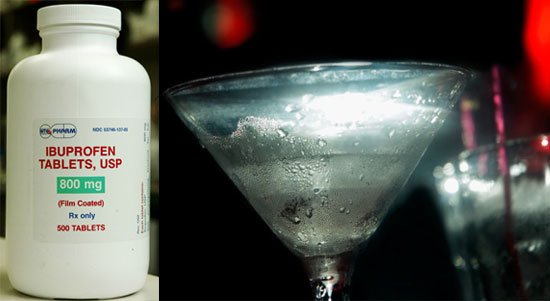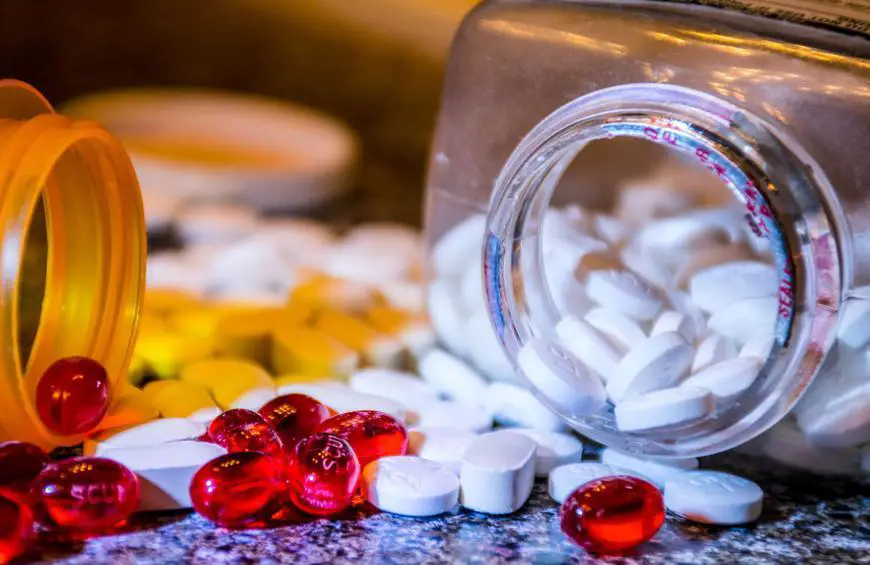We Asked A Pharmacist: Which Otc Meds Can You Take While Drinking
Weve all been there before. You get to work feeling slightly under the weather, promising yourself that youll go straight home, make some soup, and plant yourself on the couch for the evening then someone comes along and invites you to an after-work happy hour. We all know that the fastest way to getting better is to avoid alcohol 100 percent, but avoiding booze altogether can be harder than it seems. We consulted some professional advice on the situation and asked a pharmacist: Which over-the-counter medicines are safe when consuming alcohol?
Mixing alcohol with medication can be hazardous to your health, says Tara Kay, a doctor of clinical pharmacy for www.getoffprescriptionmeds.com. In a perfect world, alcohol and OTC pain meds would not be taken together. But Kay says that people often combine drinks and OTC meds. Its important to be aware of the differences between medications. Alcohol can render some medications less effective and can enhance the effects of other medications, Kay says. This can lead to undesired adverse effects.
Here are the most common OTC medications and how they interact with alcohol:
drop!
Can I Take Pain Killer After Beer
It is possible to suffer serious health problems if alcohol and over-the-counter medications are combined. Whenever you drink alcohol while taking prescription painkillers, you are at risk of a dangerous drug interaction. Alcohol and pain medication are deadly together, so it is wise not to take the two together.
Alcohol Ra And Your Bones
Liver function isnt the only concern. Beer, wine, and spirits can also lower bone density, an extremely important issue for people with RA who are at risk for developing osteoporosis or already dealing with bone loss and joint pain. Excessive alcohol consumption compromises the strength of the skeleton by interfering with the breakdown and rebuilding of bone tissue. People who have RA are already at greater risk for osteoporosis, and alcohol consumption increases those odds, according to the National Institutes of Health Osteoporosis and Related Bone Diseases National Resource Center.
Also Check: Aldi Blueberry Wine
Can You Take Pain Medicine After Drinking Alcohol
In addition, alcohol and over-the-counter medications can contribute cohol and over-the-counter medications can lead to severe health problems. The more often you drink alcohol while you take prescription painkillers, the greater the risk of a dangerous drug interaction. The combination of alcohol and pain medications can be deadly, and it is best not to do so.
How Long After Taking Naproxen Can I Drink Alcohol

10th October 2019
Mixing Naproxen and alcohol can produce a lot of dangerous side effects. Naproxen may be taken without causing any harmful effects to the body, but misusing it or mixing it with alcohol has the potential of damaging a persons health.
Naproxen has an elimination half-life of 12 to 17 hours, which means that you are okay to drink alcohol after this window of time has passed. With or without naproxen or other medications, you should only be drinking alcohol in moderation.
Naproxen works by reducing the bodys production of prostaglandin, the natural substance that is responsible for inflammatory reactions, making it an effective medicine to reduce pain and swelling. However, the beneficial result of prostaglandin is to thicken and protect the stomach lining. Taking large amounts of naproxen or mixing it with alcohol can cause damage to the lining of the stomach, which can result in upset stomach, ulcers, gastritis, or stomach bleeding.
Some of the adverse effects of drinking alcohol while on naproxen include the following:
- Holes in the stomach or intestine
- Digestion issues or heartburn
- Bloody vomit or vomit that looks like coffee grounds
- Blood in stool, or black or tar-like stools
You May Like: Substitute For Shaoxing Wine
Side Effects Of Naproxen
Taking naproxen as directed is generally not going to pose a high health risk. However, taking naproxen more often than necessary, in higher doses than directed, or in combination with other NSAIDs or alcohol can greatly increase the risk of these side effects.
Some of the side effects associated with naproxen use include:
- nausea
- yellowed eyes or skin
Stomach Ulcers And Bleeding
Ibuprofen can irritate the digestive tract, which is why doctors tell people to take this medication with food. When a person takes ibuprofen for an extended period or in high doses, it can increase their risk of gastric ulcers or bleeding in the digestive tract.
Alcohol can also irritate the stomach and digestive tract. Mixing the two further increases the risk of ulcers and bleeding.
Research shows that both drinking alcohol and taking nonsteroidal anti-inflammatory drugs , which is the class of drug that includes ibuprofen, are risk factors for stomach ulcer bleeding.
The risk of stomach ulcer bleeding increases the longer a person takes ibuprofen. A person who takes ibuprofen every day for several months has a higher risk of this symptom than someone who takes ibuprofen once a week.
You May Like: Where To Find Marsala Wine In Grocery Store
How Long Does Aleve Stay In Your System
Even if individuals do not drink alcoholic beverages when they take Aleve, health risks are still present. Aleve is a pain reliever that generally stays in the bloodstream for up to twelve hours. Accordingly, alcohol has a tendency to stay in the bloodstream for the same amount of time, depending on how much has been consumed.
What Happens If You Mix Naproxen And Alcohol
Do not drink alcohol while taking naproxen. Alcohol can increase your risk of stomach bleeding caused by naproxen. Call your doctor at once if you have symptoms of bleeding in your stomach or intestines. This includes black, bloody, or tarry stools, or coughing up blood or vomit that looks like coffee grounds.
You May Like: Price Of Glass Of Wine
Are There Any Serious Risks Or Side Effects From Nsaids
NSAIDs are generally recommended to be taken for a short period of time fewer than 10 days due to the risk of serious side effects. As mentioned, mixing alcohol with NSAIDs further raises the risk of GI bleeding and stomach ulcers.
Certain NSAIDs, such as aspirin and ibuprofen, may cause a person to bleed for a longer period of time by blocking cells that are involved in the clotting process. Alcohol can also prolong this process.
NSAIDs should be avoided by people who are pregnant or those trying to become pregnant as they may raise the risk of a miscarriage. NSAIDs should also be avoided by people who have chronic kidney disease , heart failure, or liver damage to help prevent kidney failure .
Medically Supervised Detox Programs For Alcohol Use
If someone is mixing alcohol and naproxen regularly, it may be a sign they are suffering from alcohol use or addiction. If you or someone close to you is facing alcohol addiction, there are effective treatment options available. Facing alcohol addiction can feel overwhelming, but it is treatable through the use of detox services, medication-assisted treatment, and therapeutic alcohol rehab facilities.
When an individual uses alcohol heavily, their body develops a tolerance to the substance and becomes dependent on having alcohol to function normally. If an individual stops drinking suddenly, they will likely experience dangerous withdrawal symptoms.
Some of the symptoms of alcohol withdrawal include:
- irritability
- sweating
- seizures
While most drug withdrawals are uncomfortable, they are not usually considered life-threatening. However, alcohol withdrawal can be fatal if not properly monitored. Most hospitals and drug rehab facilities will have detox services available on-site that include medication, supervision, and support throughout the withdrawal process.
Don’t Miss: How Many Carbs In A Glass Of Red Wine
Increased Risk Of Bleeding
Alcohol also suppresses the bodys ability to make blood cells, especially platelets, which are essential for clotting. When a person gets a cut, platelets are activated and help stop the bleeding. However, when the person has been drinking alcohol for a long time, the body has trouble making new platelets. If a person is injured and the body cant stop the bleeding, they may continue to bleed. This situation can be very dangerous, especially if the bleeding is on the inside of the body.
Doctors think that alcohol and NSAIDs like naproxen can increase the risk of bleeding even more when used together than when they are used separately. They suspect that alcohol and NSAIDs like naproxen have an additive risk. When a person has taken an NSAID and drinks alcohol, they are likely to bleed more, and for longer, than if they had not consumed alcohol.
Alcohol And Aleve Side Effects

Aleve inhibits the synthesis of certain hormones called prostaglandins. These hormones can cause inflammation and pain, so inhibiting their production decreases pain in the body. However, when prostaglandins arent produced, the protective lining of the stomach and intestines can be damaged. When a persons stomach lining is damaged, they may develop ulcers or experience bleeding in the stomach or intestines.
The indirect effects of Aleve on the lining of the stomach intensify when alcohol and Aleve are combined.
It is important to realize that the negative and potentially harmful side effects of mixing alcohol and Aleve might not appear right away. Over time, the risk of adverse side effects goes up. The more alcohol and Aleve a person takes together, the more they risk developing severe gastritis and stomach bleeding. For people over the age of 60, this risk is even higher.
When it comes to mixing alcohol and Aleve, there are a few important considerations to keep in mind, including:
Need help for alcohol abuse or addiction? The Recovery Village offers comprehensive treatment for alcoholism at alcohol rehab centers across the country. To learn more about our programs, today.
- Sources
Tresca, A. J. NSAIDs and peptic ulcer risk Verywell Health, 2018. Accessed March 22, 2019.
Read Also: Will You Be My Bridesmaid Wine Glasses
Can You Drink Alcohol Hours After Taking Naproxen
Taking naproxen should not involve drinking alcohol. There is a potential for alcohol to cause stomach bleeding, which is exacerbated by naproxen. Bleeding in your stomach or intestine can be treated by contacting your doctor right away. Any blood or vomit appearing as if it was coffee grounds is indicative of sickness.
What Happens If You Take Painkillers After Drinking Alcohol
However, regular use of both aspirin and alcohol can cause internal bleeding, strokes, aspirin and alcohol together can actually increase your risk of internal bleeding, stroke, or kidney failure. Alcohol and over-the-counter pain meds are certainly dangerous together, but drinking when youre taking prescription opioid painkillers poses an even greater risk.
Read Also: Bottle Of Wine How Many Ounces
Can I Take Aleve After Drinking Beer
Use Aleve as directed, and dont use it for longer than recommended. You may experience stomach bleeding and other side effects if you overuse it. You can face increased risks from taking Aleve for too long when you are drinking alcohol, just as you can with too much Aleve.
Medicines May Have Many Ingredients
Some medicationsincluding many popular painkillers and cough, cold, and allergy remediescontain more than one ingredient that can react with alcohol. Read the label on the medication bottle to find out exactly what ingredients a medicine contains. Ask your pharmacist if you have any questions about how alcohol might interact with a drug you are taking.
Read Also: Difference Between Stella Rosa Black And Black Reserve
Can You Take Lansoprazole And Drink Alcohol
The prescription medication lansoprazole is used to treat gastroesophageal reflux disease, or GERD. The condition is characterized by the backward flow of stomach acid and food into the esophagus, causing burning pain, coughing, choking and other potentially serious symptoms. Lansoprazole is known as a proton pump inhibitor, or PPI. It is used to control the production of acids in the stomach and to help the esophagus heal to prevent and treat stomach ulcers caused by the H. pylori bacteria. There is also a milder form of lansoprazole that is sold over the counter for the treatment of heartburn. Drinking alcohol while taking this medicine is not advised.
Video of the Day
What Happens If You Drink After Taking Aleve
Because Aleve is an NSAID, it can cause severe stomach bleeding. The chances of this happening are higher if you have three or more alcoholic drinks every day while taking Aleve.
Alcohol consumption can also have some similar side effects as taking Aleve, as well. Therefore, drinking alcohol while taking Aleve can intensify these side effects. Seek medical advice immediately if you are experiencing trouble after drinking alcohol and taking Aleve.
ALCOHOL REHAB HELP
- Liver damage or liver failure
- Kidney problems
You should never mix pain medications like Aleve and alcohol, especially if you have a history of gastrointestinal bleeding or stomach ulcers.
Naproxen causes a decrease in prostaglandin, a substance that thickens and protects the stomach lining. Alcohol, on the other hand, can cause an inflammatory reaction in the stomach, causing damage. Consequently, it can cause an upset stomach and increase your risk of stomach bleeding, ulcers, and gastritis.
You May Like: Total Wine Oklahoma City
How Long Do Nsaids Stay In Your System
The length of time NSAIDs can stay in your system will differ from person to person as well as what specific NSAID was taken.
The half-life, or the time it takes for the drug to be reduced in the body by half, can range from 2 hours for ibuprofen to 15 hours for naproxen. This means ibuprofen can stay in your system for about 10 hours and naproxen can stay for about 3 days.
What Are The Risks Of Mixing Alcohol With Naproxen

NSAIDs such as Naproxen may cause a variety of gastrointestinal side effects such as stomach ulcers, bleeding of the stomach, acid reflux and stomach irritation. In more severe cases, Naproxen may cause erosion of the stomach lining without any warning signs or symptoms, although the risk of this is higher in individuals that have used Naproxen for a longer period.
Gastrointestinal side effects may be higher for people of old age, have poor health, have previously suffered with a stomach ulcer or who drink more than 3 alcoholic drinks daily whilst taking naproxen.
Alcohol has also been shown to irritate the stomach and can increase the likelihood of developing gastritis and stomach bleeding. By drinking alcohol and taking naproxen there is a massive increase of developing gastritis and stomach related problems, especially if you are drinking more alcohol than the recommended daily intake and not taking naproxen as prescribed by your doctor.
Alcohol is a known to trigger some forms of arthritis such as Psoriatic Arthritis. If you are using Naproxen to help manage arthritis symptoms, alcohol intake may completely counteract the effectiveness of Naproxen at helping with the pain and inflammation of your arthritis.
The dose of naproxen you are prescribed may also play a part in experiencing side effects when consumed alongside alcohol. For example, naproxen 500mg tablets are more likely to increase the risk of experiencing side effects when compared to naproxen 250mg tablets.
Don’t Miss: Ship Wine Ups
Are Certain People More At Risk When Combining Nsaids And Alcohol
Older adults are 4 times more likely to experience GI bleeding while taking NSAIDs. They also have a higher risk of developing ulcers compared to younger people.
People assigned male at birth are 2 times more likely to have upper GI tract bleeding than people assigned female at birth. Sadly, theres a lack of research about how these numbers impact people that identify as nonbinary, intersex, and transgender.
Alcohol further raises this risk of GI bleeding because it may damage the lining of the stomach, which provides protection and helps prevent these effects from occurring.
What Pain Reliever Can I Take With Alcohol
In other words, its fairly safe to occasionally take a low dose of ibuprofen, acetaminophen, or naproxen if youve had a small amount of alcohol. However, because of the potential for long-term consequences, it is still prudent to avoid mixing painkillers with alcohol, Drs. Lembke and Free both emphasize.
Repeated use will just progress the damage, making it difficult for the body to rebound back, Dr. Free says. Instead, she advises rehydrating your body with water and plenty of electrolytes as treatment options for a hangover. And Dr. Lembke says it is better to just avoid drinking to the point of needing a painkiller altogether.
RELATED: 14 hangover cures that work
If you are drinking so much that you have a hangover, you might want to look at your drinking habits, she says. Because if you have had enough that you have a hangover, you have had too much.
The general rule of thumb for safe alcohol consumption, she says, is no more than seven drinks per week and definitely no more than three drinks on any one occasion. Anything above that is considered risky drinking and is associated with all sorts of adverse health outcomes, she says.
You May Like: Malibu Animal Safari
Can You Mix Naproxen And Alcohol
Because naproxen works to reduce prostaglandin in the body, which is responsible for inflammatory reactions, the drug is typically used to reduce pain and swelling. However, the positive parts of prostaglandin thicken and protect the stomach lining, so taking large amounts of naproxen or taking naproxen with alcohol can cause damage to the stomach lining. This can result in chronic upset stomach, ulcers, stomach bleeding, or gastritis.
Some of the risks of drinking alcohol with naproxen include:
- holes in the stomach or intestine
- heartburn and digestion issues
- vomit that has blood or looks like coffee grounds
- blood in the stool, black or tar-like stools